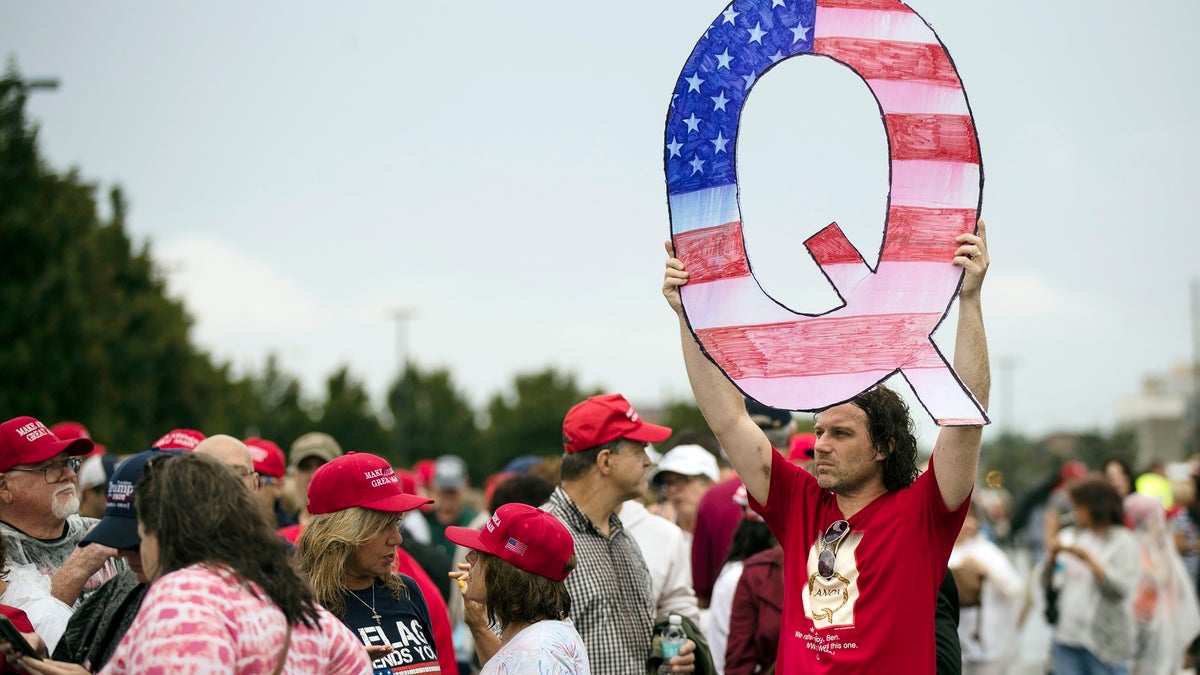
A man holds a 'Q' sign while waiting to enter a Pennsylvania rally with President Trump. (AP Photo/Matt Rourke)
In 2018, as President Trump traveled across the country, spectators have been spotted holding up giant cutouts of the letter Q and wearing T-shirts with the hashtag, #WeAreQ.
So who are they?
Under the radar until now, they are members of the fringe, right-wing group QAnon that believes in massive conspiracies in the media and the so-called “deep state” to take down Trump.
The group “is just hitting the right audience at the right time given the right circumstance,” Joseph Uscinski, a University of Miami professor who co-authored the book “American Conspiracy Theories,” told The Associated Press. He said the topics appeal to many who are already inclined to believe conspiracy theories.
Read on for a look at what QAnon is, and why it’s been in the news lately.
What does the group believe?
There are several conspiracy theories this group has latched on to, especially the belief there is a network of people, including in the U.S. government, that wants to take down Trump and his administration, according to The New York Times.
With the outbreak of the Coronavirus, QAnon followers have begun to spread false "treatments" for the virus. Furthermore, the group have accused liberal billionaire George Soros of rigging the Iowa Democratic caucuses following its flawed outcome.
A previous theory, according to NPR, held that Special Counsel Robert Mueller was not actually investigating allegations of Russian interference and collusion in the 2016 election. Rather, the former FBI director looked into prominent Democrats — including former President Barack Obama and Hillary Clinton, Trump’s 2016 opponent — and their relationship with Russia or potential connections to a massive (unsubstantiated) pedophile ring.
Another belief is the military asked Trump to run for president in order to deal with the nefarious group of people in government, according to NPR.
The group also has its own lingo. Aside from calling the leader simply "Q," they refer to those who attempt to debunk the group and its theories as “clowns,” and those who follow along as “bakers."
How did it get started?
According to The Associated Press, an anonymous person posted on the online messaging website 4chan in October 2017 claiming to have a high-level government security clearance — a "Q clearance," to be exact — and discussed Trump, Obama, Clinton, political donor George Soros and others. The message was titled, “The Calm Before the Storm,” which many believe to be a reference to a meeting Trump had with military leaders earlier that month when he used the same phrase.
The poster, "Q," leaves what are called “breadcrumbs,” or clues for followers to decipher to figure out the conspiracy theories.
It’s unclear who "Q" actually is, and if he or she is just one person or a group.
Why have they made headlines?
People holding signs or wearing apparel referencing QAnon started showing up at Trump rallies and other political events in early 2018.
A group marched to the Department of Justice in protest in April 2018. And a 30-year-old man was arrested for alleged terrorist acts, among other things, after he blocked a highway near the Hoover Dam with his armored truck, calling for the release of a Justice Department report pertaining to Clinton’s email server, WTVR reported. The man involved in that June incident is believed to have been associated with QAnon.
Roseanne Barr, the embattled actress whose namesake show was canceled this year after she tweeted racist sentiments about a former Obama administration official, has also apparently retweeted messages from its Twitter account and asked to make contact with the leader.
In June 2018, she also tweeted the phrase “wwg1wga,” which NPR translated as “where we go one, we go all," a common phrase among supporters.
Anything else to know about the group?
It looks for validation, especially in the number 17, which coincides with where Q is in the alphabet.
For example, the University of Alabama national champion football team gave Trump a jersey with the number 17 on it earlier this year when it visited the White House. As The New York Times reported, some who adhere to the Q group believe it’s a symbol that it exists; others online believe it shows Trump, himself, is "Q."
The Associated Press contributed to this report.





















